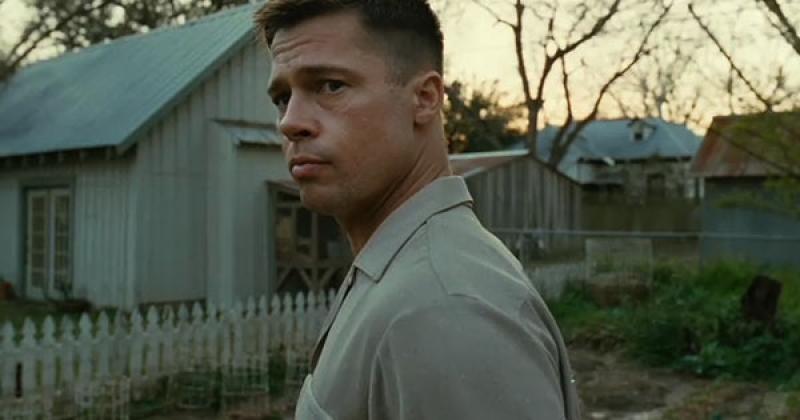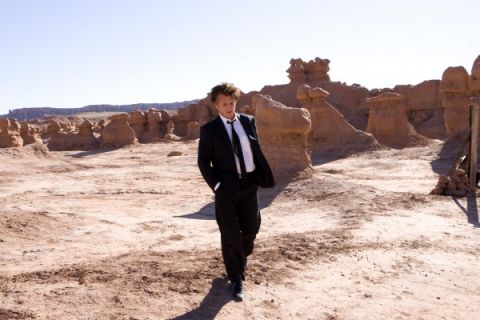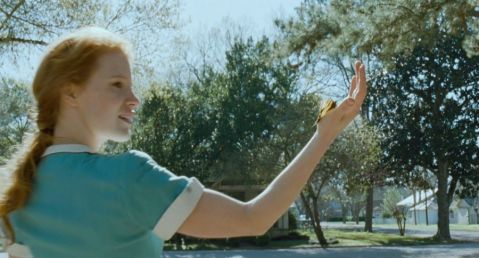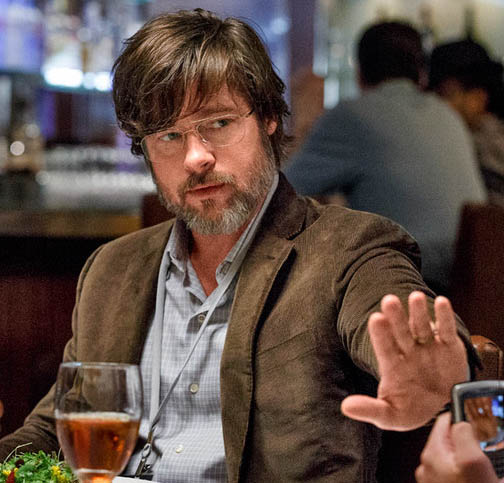The Tree of Life | reviews, news & interviews
The Tree of Life
The Tree of Life
Terrence Malick’s elliptical epic leads us through time, space and one family’s story

At the end of last week it was reported that a Connecticut cinema, besieged with requests for refunds, had posted up a sign warning punters that The Tree of Life “does not follow a traditional, linear narrative approach to storytelling”. And so what? Terrence Malick’s Palme d’Or winner is certainly elliptical and impressionistic, but it’s also spellbinding, and as lofty and luminous as the stars in the sky.
The Tree of Life is only Malick’s fifth feature in a career spanning 38 years, and it feels like the culmination of a life’s work. All his familiar themes are present - disaffection, thrall to nature, spirituality, the looming spectre of death – and they are presented in their most grandiose (and, yes, least conventionally cohesive) manner yet. Despite its thematic similarities to his other work, the scale of Malick’s vision means it feels a world away from his playful, pared-down (but quite brilliant) debut Badlands (1973).
The story follows a Texan family from the Fifties all the way through to the present day and, in particular, focuses on the eldest of three boys, Jack O’Brien - played by Sean Penn as an adult (pictured below right), and Hunter McCracken as a child. Within moments of the film’s opening the family are dealt a cruel blow: one of the sons is dead. We see parental grief captured in fleeting, dancing images and snatches of dialogue (“I just want to die - be with him”). A missive delivers the devastating news to Mrs O’Brien (Jessica Chastain, pictured below left) who, in turn, telephones her husband (an unusually buttoned-up Brad Pitt).
From leafy mid-20th-century suburbia the film hurtles into the future and to the blinding white metropolis of Houston, where we meet the fully grown Jack. Despite his apparent success he is wracked with melancholia, at odds with his environment and beset by memories of his childhood and brother’s death. Jack’s perspective is one of extremes; he does as many do, seeing the world both from the top down, sitting in judgment on his fellow man, and from the bottom up, looking searchingly to the heavens for answers. He is simultaneously important and utterly insignificant.
 Then, in a gobsmacking digression, Malick chooses to interrupt the family’s story with a sequence depicting the birth of the universe, not unlike Kubrick’s evolutionary opener in 2001: A Space Odyssey (1968). In collaboration with 2001’s pioneering special effects guru Douglas Trumbull, Malick presents us with the majesty and ferocity of creation (and even dinosaurs). He makes this an integral part of Jack’s story, as it is – one may infer - an integral part of all of ours. As Sissy Spacek remarks in Badlands, we are each of us “playing our part in a larger story”.
Then, in a gobsmacking digression, Malick chooses to interrupt the family’s story with a sequence depicting the birth of the universe, not unlike Kubrick’s evolutionary opener in 2001: A Space Odyssey (1968). In collaboration with 2001’s pioneering special effects guru Douglas Trumbull, Malick presents us with the majesty and ferocity of creation (and even dinosaurs). He makes this an integral part of Jack’s story, as it is – one may infer - an integral part of all of ours. As Sissy Spacek remarks in Badlands, we are each of us “playing our part in a larger story”.
When we return to the family it’s to happier times, with Jack’s birth and blissful early years, before the film settles on a significant, more tumultuous period in his life - the onset of puberty and its associated revelations. He finds himself consumed with both destructive and procreational impulses, echoing the violent cosmic creation that has gone before. He begins to notice life’s cruelties and the unhappiness that surrounds him, particularly the fallibility and dissatisfaction of his father and the mounting misery of his angelic mother.
 There is of course much, much more to this film, not least the otherworldliness of that highly debatable ending. The Tree of Life is breathtaking in its vision, richness and technique and has a waltzing fluidity which belies its unconventional narrative structure. It’s also the most undisguised manifestation of Malick’s God complex we’ve seen. His body of work frequently features individuals at their most emotionally heightened or fragile, yet their stories are presented to us by a detached, elevated, almost ethereal observer. He brings you close enough for characters to captivate but, more often than not, they remain stubbornly unknowable. In this case, although both Pitt and Chastain acquit themselves impressively (there’s no Richard Gere in Days of Heaven-style blankness), ultimately their symbolic worth - as the forces of nature and grace respectively - outweighs their importance as characters.
There is of course much, much more to this film, not least the otherworldliness of that highly debatable ending. The Tree of Life is breathtaking in its vision, richness and technique and has a waltzing fluidity which belies its unconventional narrative structure. It’s also the most undisguised manifestation of Malick’s God complex we’ve seen. His body of work frequently features individuals at their most emotionally heightened or fragile, yet their stories are presented to us by a detached, elevated, almost ethereal observer. He brings you close enough for characters to captivate but, more often than not, they remain stubbornly unknowable. In this case, although both Pitt and Chastain acquit themselves impressively (there’s no Richard Gere in Days of Heaven-style blankness), ultimately their symbolic worth - as the forces of nature and grace respectively - outweighs their importance as characters.
The Tree of Life is certainly a film to admire, revisit and puzzle over, though whether it’s one to cherish will be down to the individual. It’s a strange and beautiful beast, both in love with the wonder of science and overtly, almost alienatingly religious. At 139 minutes it’s nearly 20 minutes shorter than the latest instalment in the Transformers franchise and an immeasurably better use of your time. Characteristically poetic, for sheer spectacle and brazen audacity it rivals anything made in the last decade. Whereas James Cameron’s Avatar (2009) gave us a new world to goggle (and baulk) at, Malick is still very much in love with the potential of this one.
BRAD PITT’S BIG MOMENTS
 Allied. Doomed but entertaining attempt to revive 1940s Hollywood
Allied. Doomed but entertaining attempt to revive 1940s Hollywood
Fury. David Ayer and Brad Pitt take the war film by the scruff of the neck
Inglorious Basterds. Pitt is gloriously absurd in Tarantino WW2 alternative history
Killing Them Softly. Brad Pitt cleans up an almighty mess in Andrew Dominik’s high-calibre crime ensemble
Moneyball. How Billy Beane created a revolution in Major League baseball
The Big Short. Pitt’s on the money as director Adam McKay successfully makes a drama out of a crisis
The Counsellor. Ridley Scott ensemble thriller is nasty, brutish and short or mysterious, upsetting and alluring
PLUS ONE TURKEY
World War Z. It's World War with a Zee as Brad Pitt battles the undead and a zombie script
Share this article
Add comment
The future of Arts Journalism
You can stop theartsdesk.com closing!
We urgently need financing to survive. Our fundraising drive has thus far raised £49,000 but we need to reach £100,000 or we will be forced to close. Please contribute here: https://gofund.me/c3f6033d
And if you can forward this information to anyone who might assist, we’d be grateful.

Subscribe to theartsdesk.com
Thank you for continuing to read our work on theartsdesk.com. For unlimited access to every article in its entirety, including our archive of more than 15,000 pieces, we're asking for £5 per month or £40 per year. We feel it's a very good deal, and hope you do too.
To take a subscription now simply click here.
And if you're looking for that extra gift for a friend or family member, why not treat them to a theartsdesk.com gift subscription?
more Film
 London Film Festival - from paranoia in Brazil and Iran, to light relief in New York and Tuscany
'Jay Kelly' disappoints, 'It Was Just an Accident' doesn't
London Film Festival - from paranoia in Brazil and Iran, to light relief in New York and Tuscany
'Jay Kelly' disappoints, 'It Was Just an Accident' doesn't
 Iron Ladies review - working-class heroines of the Miners' Strike
Documentary salutes the staunch women who fought Thatcher's pit closures
Iron Ladies review - working-class heroines of the Miners' Strike
Documentary salutes the staunch women who fought Thatcher's pit closures
 Blu-ray: The Man in the White Suit
Ealing Studios' prescient black comedy, as sharp as ever
Blu-ray: The Man in the White Suit
Ealing Studios' prescient black comedy, as sharp as ever
 The Woman in Cabin 10 review - Scandi noir meets Agatha Christie on a superyacht
Reason goes overboard on a seagoing mystery thriller
The Woman in Cabin 10 review - Scandi noir meets Agatha Christie on a superyacht
Reason goes overboard on a seagoing mystery thriller
 London Film Festival 2025 - crime, punishment, pop stars and shrinks
Daniel Craig investigates, Jodie Foster speaks French and Colin Farrell has a gambling habit
London Film Festival 2025 - crime, punishment, pop stars and shrinks
Daniel Craig investigates, Jodie Foster speaks French and Colin Farrell has a gambling habit
 I Swear review - taking stock of Tourette's
A sharp and moving tale of cuss-words and tics
I Swear review - taking stock of Tourette's
A sharp and moving tale of cuss-words and tics
 A House of Dynamite review - the final countdown
Kathryn Bigelow's cautionary tale sets the nuclear clock ticking again
A House of Dynamite review - the final countdown
Kathryn Bigelow's cautionary tale sets the nuclear clock ticking again
 theartsdesk Q&A: Idris Elba on playing a US President faced with a missile crisis in 'A House of Dynamite'
The star talks about Presidential decision-making when millions of lives are imperilled
theartsdesk Q&A: Idris Elba on playing a US President faced with a missile crisis in 'A House of Dynamite'
The star talks about Presidential decision-making when millions of lives are imperilled
 Urchin review - superb homeless drama
Frank Dillane gives a star-making turn in Harris Dickinson’s impressive directorial debut
Urchin review - superb homeless drama
Frank Dillane gives a star-making turn in Harris Dickinson’s impressive directorial debut
 Mr Blake at Your Service review - John Malkovich in unlikely role as an English butler
Weird comedy directed by novelist Gilles Legardinier
Mr Blake at Your Service review - John Malkovich in unlikely role as an English butler
Weird comedy directed by novelist Gilles Legardinier
 Don't Let's Go to the Dogs Tonight review - vivid adaptation of a memoir about a Rhodesian childhood
Embeth Davidtz delivers an impressive directing debut and an exceptional child star
Don't Let's Go to the Dogs Tonight review - vivid adaptation of a memoir about a Rhodesian childhood
Embeth Davidtz delivers an impressive directing debut and an exceptional child star

Comments
...